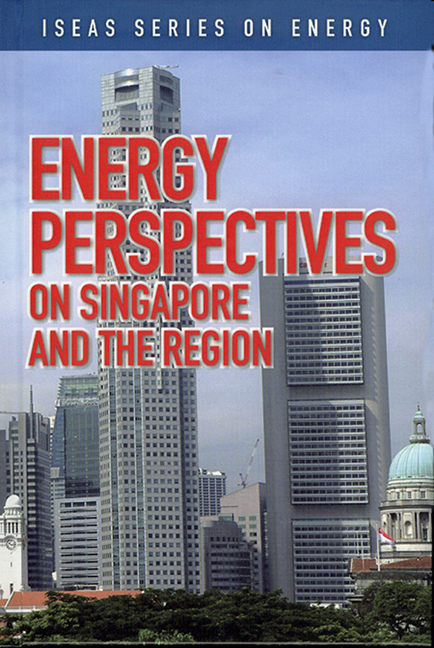Book contents
- Frontmatter
- Contents
- Foreword
- Preface
- The Contributors
- 1 Overview of Singapore's Energy Situation
- 2 Singapore's Changing Landscapes in Energy
- 3 Singapore's Role as a Key Oil Trading Centre in Asia
- 4 Large-Scale Solar PV Power Generation in Urban High-Rise Buildings in Singapore
- 5 The High-Carbon Story of Urban Development in Southeast Asia
- 6 Renewable Energy and the Environment: Technology and Economic Perspectives
- 7 Delivering Results in a Booming Rig Market
- 8 The Success Story of Rig Building in Singapore
- 9 The Singapore Oil Situation
- 10 Singapore Petroleum Company: Adding Value to the Singapore Oil Industry
- 11 Oil Storage: The Singapore Story
- REGIONAL and INTERNATIONAL
- 12 The Outlook for Energy: A View to 2030
- 13 India's Energy Situation: The Need to Secure Energy Resources in an Increasingly Competitive Environment
- 14 The Implications and Impacts of China's Oil Demand on the Asia Pacific
- 15 Energy Security Cooperation in Asia: An ASEAN-SCO Energy Partnership?
- 16 China's Energy Security: Geo-politics versus Interdependence
- 17 The Strategic Challenges for the United States and China in Global Energy Supply
- 18 China's Coal: Curse or Blessing
- 19 Japan's New Energy Strategy
- 20 Who Wins in the Asian Scramble for Oil?
- 21 New Horizons for Liquefied Natural Gas (LNG) East of Suez
- 22 Bio and Synthetic Fuels: An Alternative for Sustainable Mobility
- 23 Price Discovery for Middle East Refined Product Exports: A Natural Role for Dubai
- 24 The Outlook for Gas in Southeast Asia
- 25 Sakhalin-2 Project, a New Energy Source for the Asia Pacific: History in the Making
- Index
13 - India's Energy Situation: The Need to Secure Energy Resources in an Increasingly Competitive Environment
from REGIONAL and INTERNATIONAL
Published online by Cambridge University Press: 21 October 2015
- Frontmatter
- Contents
- Foreword
- Preface
- The Contributors
- 1 Overview of Singapore's Energy Situation
- 2 Singapore's Changing Landscapes in Energy
- 3 Singapore's Role as a Key Oil Trading Centre in Asia
- 4 Large-Scale Solar PV Power Generation in Urban High-Rise Buildings in Singapore
- 5 The High-Carbon Story of Urban Development in Southeast Asia
- 6 Renewable Energy and the Environment: Technology and Economic Perspectives
- 7 Delivering Results in a Booming Rig Market
- 8 The Success Story of Rig Building in Singapore
- 9 The Singapore Oil Situation
- 10 Singapore Petroleum Company: Adding Value to the Singapore Oil Industry
- 11 Oil Storage: The Singapore Story
- REGIONAL and INTERNATIONAL
- 12 The Outlook for Energy: A View to 2030
- 13 India's Energy Situation: The Need to Secure Energy Resources in an Increasingly Competitive Environment
- 14 The Implications and Impacts of China's Oil Demand on the Asia Pacific
- 15 Energy Security Cooperation in Asia: An ASEAN-SCO Energy Partnership?
- 16 China's Energy Security: Geo-politics versus Interdependence
- 17 The Strategic Challenges for the United States and China in Global Energy Supply
- 18 China's Coal: Curse or Blessing
- 19 Japan's New Energy Strategy
- 20 Who Wins in the Asian Scramble for Oil?
- 21 New Horizons for Liquefied Natural Gas (LNG) East of Suez
- 22 Bio and Synthetic Fuels: An Alternative for Sustainable Mobility
- 23 Price Discovery for Middle East Refined Product Exports: A Natural Role for Dubai
- 24 The Outlook for Gas in Southeast Asia
- 25 Sakhalin-2 Project, a New Energy Source for the Asia Pacific: History in the Making
- Index
Summary
INTRODUCTION
India is emerging as a significant economic presence in the world, and is also quickly becoming a force to contend with in world oil demand, given its needs both in terms of volumes and import dependence. The country is not self sufficient in energy, and while it has large coal resources, difficulties in access to coal reserves and low productivity have increasingly led it to import coal in recent times. Its oil dependence and the high oil prices over the last year have increasingly put energy security issues at the top of the policy agenda. This domestic priority has also tended to spill over into the foreign policy domain as it is increasingly becoming clear that securing energy requires a greater engagement with both producers and consumers of energy if energy supplies are to be augmented and an overtly competitive environment is to be avoided.
This chapter briefly analyses the current and future energy situation in India, the perceptions of risk and competition that are linked to its high hydrocarbon dependence, the strategies followed to manage risks and competition, and the author's strong recommendation that collaboration is the only way forward to create a greater global energy security. Section 2 of the chapter reviews the energy situation in India. Section 3 discusses the perception of risks and competition. Section 4 looks at the management of risks and competition, and Section 5 discusses energy collaborations as the way forward.
INDIA'S ENERGY SITUATION
India's energy situation can be characterized as one with a high energy- GDP elasticity, a low average per capita energy consumption relative to that of the world (one fifth), a high dependence on traditional energy resources in rural areas (up to 75 per cent), whilst in urban areas, it is lower, at 22 per cent. This dependence carries with it both environmental and health implications of using these sources. Moreover, one fifth of its population is still unserved by electricity resulting in difficulties in creating jobs, access to schooling, and low productivity.
- Type
- Chapter
- Information
- Energy Perspectives on Singapore and the Region , pp. 132 - 141Publisher: ISEAS–Yusof Ishak InstitutePrint publication year: 2007



